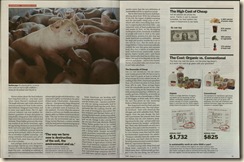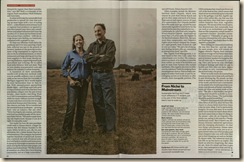Last Thursday I went to the Texas Cattle Feeders Association Annual Convention, in Amarillo, TX. One of the topics that most caught my attention was the speech provided by Forrest Roberts, NCBA (http://www.beef.org/) CEO, talking, among other subjects, about challenges for the future in the beef industry. Continuing there was another speech provided by Jim Wiesemeyer, from Washington, and also spoke about changes that the beef industry will probably have to face in the next few years.
In one of the speech it was shown a report published in the Time Magazine (August 31st, 2009) by the headlines of “Getting Real About the High Price of Cheap Food”, written by Bryan Walsh (http://www.time.com/time/health/article/0,8599,1917458,00.html). This article talks about the “way of producing” livestock and the riskiness of producing and consuming non-organic foods. Take a look in the tag or in the pictures bellow to check the report. Considering that this magazine has a world wide circulation, and worst, among people that have never been to a farm before, that don’t know the reality about how animals are raised, this is one of the most aggressive propaganda against the meat sector. Not that what is sais is a lie, but it to generalized to take it as a true for all farms.
The marketing against the “factory farm” is huge (not just this one that I cited, but several other that occurred along the last years). I, personally, do not think that those farms are the most beautiful thing in the world (I do prefer grazing than feeding), but we still have to feed this same world. And how? Producing food, producing quality and quantity, so there will be a chance for people that do not have access to organics to eat. I agree perfectly that we need to have more careful with animals welfare and have a more conscious way of producing. The point is that people take such examples as the reality of all single farms around the world. Would be nice if we all could produce in grazing, even because the cost of production is much lower, but imagine finding pastures for 100 million head that US have nowadays.
The way that people produce here in US is turning into a too expensive issue. It is a fine balance between profit and losses. Heavy incentives from the government are added to the piece of beef that is eaten everyday. Feedlots are delivering animals everyday to the slaughter, corn is steam flacked for feeding those animals and the chain goes back to ethanol, to distillers grains, to corn and soybean that can be used to human feed (not that this affect much the human feed industry, but imagine all the corn that goes to the feedlots nowadays going to barns to feed people; they can probably stop planting corn next season because the market will be overfilled with the product).
Facing the growing of the East (particularly China and India), more grains will be required, meaning more corn and soybean, what will make the prices (probably) skyjack. According to Wiesemeyer this will be one of the biggest reasons for the feeders change the feed basis and return for grazing. Allied to that will be the income with Carbon Credits generated from the pastures (and now we talk about a sensitive organ from the human body: the pocket). Those two reasons will incentive the “setback” of the cattle industry. I particularly do not agree that will be a regression, but a change in the way of producing. And, yes, the prices will increase too, probably.
But linked to that is all the marketing against beef (and now also poultry and swine) eating. Behind all this is the appeal for the unhealthiness of consuming this products. Again, because of the lack of knowledge people trend to reduce the consume or even banish it from their houses. The beef industry in US is playing hard against this “bad marketing” of meet and invested a lot in reversing the situation, telling people that the villain is not the beef, but normally the way that it is consumed.
The beef industry has a hard way ahead. Rebuilt the consumer trust by telling them their history, showing the sustainability of the beef supply chain and being prepared for the changes that are coming ahead.
Another issue regarding changes in beef industry (discussed in class with Dr. Allen) is how the consumer will face a different kind of beef, because the texture and taste of the beef and color of the fat are different, due to the grazing (diet). The American consumer is used to the feedlot finished cattle, more tender and white fat. So it will be a big change to the grazing finished beef. It might (if the changes in diet happens) take a while to the market to accept this new product.
Still talking about market, other point (discussed in class with Dr. Pond) is about the boundaries barriers settled by several countries against our meet (meaning our in Brazil and here in US). It is more a marketing regulation tool than care with health (sounds that is unhealthy, but is not what I mean). Even though, nowadays the European consumer is the one that dictates the rules of producing and all the world follows those rules, being in consuming or being in producing, because nobody wants to lose that powerful and rich market.
On the other hand, most people that support and produce organics (talking about Brazil) are the same that condemn the systems, the capitalism and everything that they can be against. The only cons is that their costumers are, mostly, people with medium to high income, that have extra money to afford buying a (most of the times uncertified, meaning about Brazil, because I don’t know how certification works here in US) organic product. Not that I am against organics, far away from that. But I think that we need to have a better overview of all chain before criticizing. Organics are normally (depends on the producer) good, healthier, tastes better and all qualities that we know. We should eat more locally, incentive producers in our community, try to find a better way to deal with hunger (that from my point of view we do not have a food crisis, we have a distribution and interest crisis). I just think that those products must be better regulated, need some rules for produce. Otherwise anybody can produce anything and say that is organic. And, careful, we can not associate always just the fact that is organic with a healthier product.
Summing up, from a Brazilian perspective, we are producing a different type of beef. A grazing produced beef. This is good for us, give us a better position in international market (even because our cost of production is low). Are we a step ahead? It is hard to say, but probably yes. What are the next rules? Nobody knows. Depends how the market will behave.
“For this report I joined subjects discussed in class with Dr. Pond and Dr Allen, part of F. Roberts and J. Wiesemeyer speech, data from Time magazine and my own opinion.”



